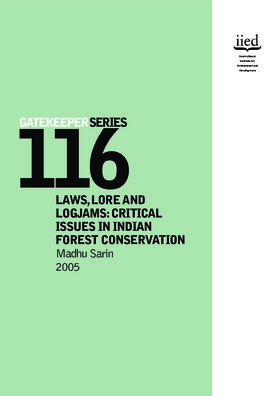Laws, lore and logjams: critical issues in Indian forest conservation. Gatekeeper Series No. 116

This paper discusses the three main obstacles to sustainable and just forest management:
1. Poor procedures and unsound premises for defining and identifying forests
2. Dissonance between tribal and conservation laws
3. Neglect of democratic decentralisation of forest governance
Unless these underlying causes are tackled, neither conservation nor social justice objectives can be achieved on a sustainable basis. Achieving these objectives requires the democratic decentralisation of forest governance. Among the many actions listed in this paper, the author recommends:
• Ensuring clear demarcation of the forest resource, including details of its ecological characteristics and livelihood functions, and clear jurisdictional authority.
• Replacing the ad hoc forest policy objective of 33% national forest cover with state-specific objectives based on ecosystem, biodiversity and land capability surveys.
• Harmonising the implementation of conservation laws with the constitutional provisions for protecting the cultures, livelihood systems and resource rights of tribal and indigenous communities.
• Moving away from centralised, bureaucratic forest management (including ‘Joint Forest Management’) towards holistic community-based forest and natural resource management. The focus should be on devolving responsibility and management authority for conservation and sustainable use to local community institutions based on clear common property rights.
• Nurturing self governing, democratic and gender equal local institutions, building upon existing community initiatives, traditions and resource management systems.
Cite this publication
Available at https://www.iied.org/g01119